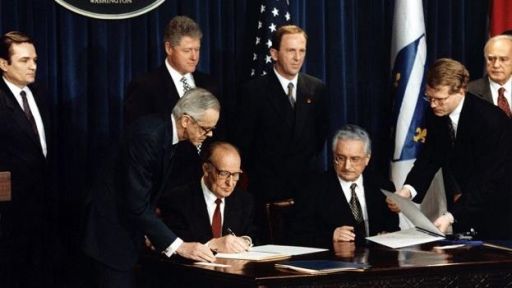Bosnia marks 27th anniversary of Dayton Peace agreement

Bosnia and Herzegovina on Monday marked the 27th anniversary of the Dayton Peace Agreement which ended the 1992-1995 war and brought peace while enabling the country to have the most complex political structure in the world.
The deal is viewed as "an expired peace agreement" in the country.
The accords, initiated at the Wright-Patterson U.S. Air Force base near Dayton, Ohio, on Nov. 21, 1995, ended a brutal civil war in Bosnia that resulted in around 100,000 deaths over three-and-a-half years.
However, nearly 3.5 million people today are living in one of the most fragile and multi-ethnic states in the world, facing economic difficulties and political deadlocks due to a complex constitutional structure.
Dayton built Bosnia and Herzegovina as a single state, but consisting of two entities -- the Croat-Muslim Federation of Bosnia and Republika Srpska -- as well as Brcko, a neutral, self-governing canton.
The accords, which were agreed upon by then Serbian President Slobodan Milosevic, Bosnia’s Alija Izetbegovic, and Croatian leader Franjo Tudjman, also established several mechanisms that institutionalized Bosnian, Serb, and Croat divisions.
The tripartite Presidency of the country is a clear example of the structural complexity.
The country also has ethnic quotas in public institutions, and the groups have veto rights on "vital interests" in decision-making.
This hybrid political establishment has led to the country being governed by three presidents, 14 prime ministers, and 136 ministers for nearly three decades.
Therefore, citizens at local and national levels are apathetic toward influencing political decisions due to a range of institutional shortcomings.
The peace agreement and its system have been publicly described as one which "needs updating."
Meanwhile, the agreement is also viewed as an obstacle to Bosnia and Herzegovina's progress as well as its membership in the European Union and NATO.
Although the "Dayton 2" or "New Dayton" debates are often on the agenda, those who make use of the complex system do not allow such discussions to remain on the agenda for long periods of time or make necessary changes.
At the point of Dayton's update, the only major powers and the international community are involved.
Türkiye's President Recep Tayyip Erdogan earlier said that the 1995 Dayton Agreement should be revisited, as it was not generating a solution for Bosnia and Herzegovina's future.
"Unfortunately, Dayton could not be an agreement aiming for a solution in Bosnia-Herzegovina. But under the conditions of that day, I heard this from the late Alija himself, 'We had nothing else to do,' he said, 'We were forced to sign it then'. It means he was not pleased," Erdogan said during his last visit in 2022.
He added that the three leaders should collaborate to make a decision about Bosnia-Herzegovina.
"The unity, solidarity, and integrity of Bosnia-Herzegovina are very important. They paid a high price. I hope that from now on, Bosnia-Herzegovina will not pay a price anymore," he said.
The main and perhaps only benefit of the Dayton Peace Agreement is silencing weapons and preventing further deaths.
US diplomat Richard Holbrooke, who participated in the Dayton talks, said: "The people of Bosnia and Herzegovina should live with this agreement for at least 15 years and that (after this period) it is time to change it."
Holbrooke's statement expresses the views of the architects of the agreement.
Many Bosnian politicians and experts agree on the renewal of the agreement for the country's development and progress toward EU and NATO membership.
The Constitution, which also includes discrimination against other nations, is the biggest obstacle for Bosnia and Herzegovina on its way to the EU.
High representative's controversial laws
Christian Schmidt, the high representative of Bosnia and Herzegovina, announced on the night of the general elections, he had enacted the controversial electoral law reform, using his "Bonn powers."
After polls closed in the Balkan country's presidential and parliamentary votes, Schmidt claimed that he signed two decisions for the functionality and timely implementation of the election results in the document that he called the "functionality package" and added that the decisions were related to the government and coalition building processes.
The decision received strong criticism from politicians and citizens.
This would be the third time Schmidt uses the so-called "Bonn powers" after assuming office in August 2021.
The first time he did it was to annul a law on immovable property in Republika Srpska, the Serb-dominated entity.
The second time, Schmidt used his "Bonn powers" to finance the country's general elections on Oct. 2, allocating €6.5 million ($6.97 million) for the Central Election Commission.
The Office of the High Representative was established with the Dayton Peace Agreement that ended the 1992-1995 war in Bosnia Herzegovina.
The office oversees the implementation of the peace agreement on behalf of the international community.
The high representative also coordinates the activities of international institutions operating in the country.
The high representative has the authority to dismiss anyone who interferes with the implementation of peace in the country, including members of the Presidential Council, and to pass laws as necessary.
The powers are dubbed "Bonn powers."
AA







